Did you know that in Canada, more than one in five people, or 22.3% of the population, live with a disability?1 In the arts community, artists who are D/deaf and/or living with a disability account for 15.1% of the artist population, yet they receive 0.7% of arts funding.2
The Conseil des arts de Montréal is strongly committed to making its programs and services accessible to all Montrealers. Since 2018, the Conseil has undertaken numerous consultations with the arts community to improve its internal practices and create tools for the community. We also hired accessibility consultant Charlotte Jacob-Maguire, who established the Conseil’s Advisory Committee on Universal Accessibility and Anti-Ableism.
Today, we are very excited to launch several tools and guides to share best practices for collaborating with artists who are D/deaf and/or living with a disability. Developed with our consultant, these relevant, practical resources are intended for both the arts community and the Conseil itself.
Guides and tools
- The Recommendations and Tools for the Conseil des arts de Montréal guide, which details a host of recommended measures for the Conseil to ensure that people who are D/deaf and/or living with a disability have equal opportunities to access its programs and services.
- The Guide for Events provides useful directions on various accessibility considerations when organizing an event.
- The Resource Bank is a list of accessibility resources (professionals, foundations, organizations, suppliers, articles, etc.).
- The Access Rider is a flexible tool that allows people living with a disability to identify their specific accessibility needs for meetings and collaborations.
- The Conseil des arts de Montréal’s Visual Timeline is a map of the Maison du Conseil that includes photos of parking lots, public transit, washrooms, studios, offices and emergency exits to facilitate access to our premises.
- An Inclusive Practices section has been added to the Glossary and includes a long list of inclusive practices terms to promote the use of respectful language that is adapted to individuals’ realities.
Over the past three years, many initiatives have been implemented to make the Conseil’s services more accessible for people who are D/deaf and/or living with a disability.
Sustainability of inclusive practices programs
Following the launch of a pilot program to support inclusive practices in 2019, two complementary funding programs will now be available on a permanent basis:
- the Grant for Artists who are Deaf or have a disability, which allows artists who are D/deaf and/or living with a disability and collectives and organizations with at least one member who is D/deaf and/or living with a disability to obtain project funding.
- the Support Fund for Accessibility Costs, which provides additional financial support to people who are D/deaf and/or living with a disability to cover additional costs.
Access to existing programs
It is now possible to view some of our calls for applications in various formats on our website to meet the needs of people who are D/deaf and/or living with a disability (text versions for screen readers and digital reading software, interpretation in Quebec Sign Language and American Sign language, a short version, etc.).
The Conseil also develops specific training courses for artists who are D/deaf and/or living with a disability. For example, the Conseil held its first-ever workshop on financial support applications for people who are D/deaf and hard of hearing people in October 2021 through a collaboration with Seeing Voices Montréal.
In accordance with its 2018–2020 strategic plan, the Conseil wishes to identify, acknowledge and support inclusive practices that promote the involvement and engagement of artists, cultural workers and underrepresented, excluded or marginalized audiences. We are committed to listening to the needs of people who are D/deaf and/or living with a disability by being present in the arts community, creating training and raising awareness about accessibility within our teams and the arts community in general.
A big thank you to everyone who helped make these actions and resources a reality, in particular Charlotte Jacob-Maguire and the Advisory Committee on Universal Accessibility and Anti-Ableism, comprised of Audrey-Anne Bouchard, Catherine Théroux, Gaëtane Cummings, Hodan Youssouf, Lucila Guerrero, Maxime D.-Pomerleau, Menka Nagrani, Paul Tshuma, Roxane Charest-Landry accompanied by Cindy Schwartz and Salima Punjani.
2 Deaf and Disability Arts Practices in Canada report, published by the Canada Council for the Arts, 2020 (data from 2012).



